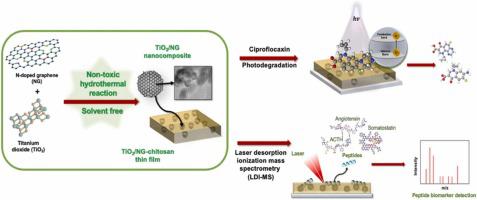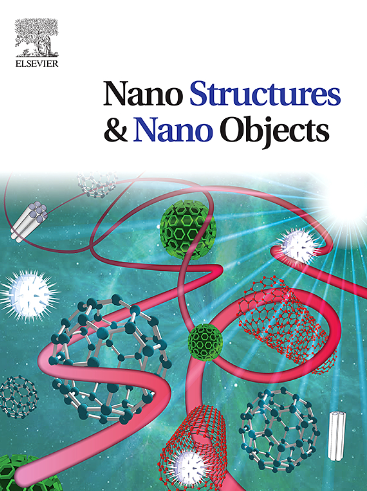Titanium dioxide/nitrogen-doped graphene-biopolymer based nanocomposite films for pollutant photodegradation and laser desorption ionization mass spectrometry of biomarkers
Abstract
Titanium dioxide (TiO2)/nitrogen-doped graphene (NG) nanocomposite is prepared via a solvent-free hydrothermal reaction. The resulting TiO2/NG materials exhibit a reduction of the band gap energy compared to pristine TiO2 from 3.27 eV to 2.69 eV. These materials are characterized by scanning transmission electron microscopy (STEM), energy dispersive X-ray spectroscopy (EDX), and X-ray photoelectron spectroscopy (XPS). To prepare biopolymer films with photocatalytic properties, TiO2 and NG are mixed with biodegradable chitosan and spin-coated on a silicon wafer. Film roughness and thickness are evaluated by atomic force microscopy (AFM). These films are then tested for ciprofloxacin photodegradation by irradiating with visible light. In comparison to the TiO2/chitosan films, the addition of NG substantially enhances photodegradation efficiency by up to 34 % upon the addition of 5 % w/w of NG. Furthermore, this film is shown to be a good substrate for biomarker detection using laser desorption ionization mass spectrometry (LDI-MS). In summary, this nanocomposite-biopolymer film provides good photocatalytic activity towards ciprofloxacin degradation and enhances the ionization efficiency of peptide biomarkers in LDI-MS owing to high efficiency of laser absorption/desorption. This nanocomposite film might be useful for environmental-related and medical application.


| 公司名称 | 产品信息 | 采购帮参考价格 |
|---|
 求助内容:
求助内容: 应助结果提醒方式:
应助结果提醒方式:


